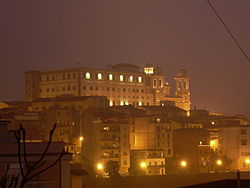Valmontone
| Valmontone | ||
|---|---|---|
| Comune | ||
| Comune di Valmontone | ||
 |
||
|
||
| Location of Valmontone in Italy | ||
| Coordinates: 41°47′N 12°55′E / 41.783°N 12.917°E | ||
| Country | Italy | |
| Region | Lazio | |
| Province / Metropolitan city | Rome | |
| Government | ||
| • Mayor | Alberto Latini (Democratic Party) | |
| Area | ||
| • Total | 40 km2 (20 sq mi) | |
| Elevation | 303 m (994 ft) | |
| Population (31 August 2015) | ||
| • Total | 15,918 | |
| • Density | 400/km2 (1,000/sq mi) | |
| Demonym(s) | Valmontonesi | |
| Time zone | CET (UTC+1) | |
| • Summer (DST) | CEST (UTC+2) | |
| Postal code | 00038 | |
| Dialing code | 06 | |
| Patron saint | St. Luigi Gonzaga | |
| Saint day | June 21 | |
| Website | Official website | |
Valmontone is a comune (municipality) in the Metropolitan City of Rome in the Italian region Lazio, located about 45 kilometres (28 miles) southeast of Rome.
The historic part of the town is situated on a tuffaceous hill, 303 metres (994 feet) above sea level, part of a morphological system of valleys and low relieves, known as Alta Valle del Sacco (High Valley of Sacco River). There are many natural springs due to the high water levels underground. Because of this the landscape is covered by forest and farmland.
To preserve this water system, in Valmontone exists the C.E.R.I., a center for the prevention and control of hydro-geological risks.
The origins of Valmontone are uncertain: it seems that a village was founded before the rise of Rome on a hill in the modern municipality of the town, and its ruins were visible until the 18th century. Perhaps these are the remains of the ancient Labicum, which, according to the myth, was founded by Glaucus, Minos’ son: the name of the village derives from a kind of Greek shield. Labicum was in war against Rome, but at last it was defeated and became a Roman castrum, a fortified castle: other testimonies of the Roman period are the post-station Ad Bivium, situated along the road called Via Latina, a village of coal-makers, some furnaces for tiles and vases, a villa and some other remains (two sarcophagus, memorial plates).
Later on, the castle was rebuilt on the actual site in the Late Roman Empire. The presence of a Castrum Lateranense goes back to the 1052, while the name of Vallis Montonis (Valmontone means “a valley overhung by a little hill”) appears the first time in a document dated 1139. Valmontone became a fief under the Conti family until the 16th century, when, in 1548, the fief passed under the Sforza then, in 1632 and for a few years, under the Barberini, until Camillo Pamphili bought Valmontone (1634). The Pamphili family became Doria-Pamphili-Landi in the 18th century. In 1843 Valmontone assumed the rank of “city” by decision of Pope Gregory XVI.
...
Wikipedia


